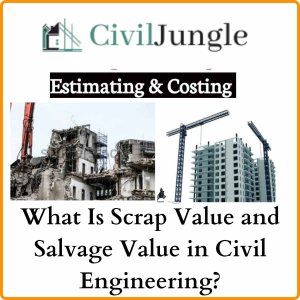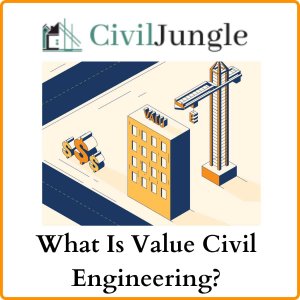
What Is Scrap Value and Salvage Value in Civil Engineering?

Scrap Value in Civil Engineering
The value of decommissioned materials at the end of the usefulness life of the property is completely meaningless, with the exception of sales as scrap. When an old building is sold after usable life, some useable material such as bricks, steel, timber products etc. can be obtained.
10 percent scrap value is considered for entire construction. It is sometimes referred to as a demolition value or trash value. In rare cases, if demolition or disassembly costs equal to or exceed the scrap value, it will become zero
Salvage Value in Civil Engineering
The resale value at the end of an asset’s useful life is defined as the estimated or expected salvage value. The depreciation of the assets utilized is related with this characteristic.
The loss in the market value of an asset owing to time, wear and tear and obsolescence is characterized as the decline. Without regard to the cost of dismantling or removal of the object, the salvage value is assessed.

What Is Scrap Value?
The value of a physical object’s various components when the item itself is judged no longer usable is referred to as scrap value. After a long-term asset, such as machinery, a car, or furniture, has served its purpose, it may be disposed of.
Scrap value can also be referred to as residual value, salvage value, or break-up value. The scrap value of a fixed asset is the anticipated cost that it may be sold for after full depreciation.
What Is Salvage Value?
The salvage value of an asset is its projected resale value at the end of its useful life. It is deducted from the cost of a fixed asset to calculate the amount that will be depreciated. As a result, salvage value is included in the depreciation computation.
If determining a salvage value is too complex, or if the salvage value is projected to be low, it is not essential to include a salvage value in depreciation calculations.
Instead, just depreciate the fixed asset’s total cost over its useful life. Any profits from the asset’s ultimate disposal would subsequently be recorded as a gain.
The salvage value idea can be abused to estimate a high salvage value for particular assets, resulting in under-reporting of depreciation and, as a result, larger profits than would otherwise be the case. The salvage value is not reduced to its present worth.
Types of Value in Civil Engineering
The worth or utility of a structure, property, machinery, equipment, or other item is referred to as value. Value fluctuates over time and is always influenced by supply and demand.
The property’s value in a short period of time may be greater than its current worth or price. There are many different types of values that are utilized when estimating and costing a product.
1. Scrap Value
The value of dismantled materials is known as scrap value. When the life of a structure comes to an end at the end of its useful life, the deconstructed materials such as steel, timber, bricks, and other materials will fetch a particular amount of money, which is known as the Scrap Value of that building.
2. Salvage Value
At the end of the utility period it’s the value of the building without dismantling. For example, a machine may be sold and the same machine can be purchased from the other person after it has finished its normal lifetime or when use is unfavorable.
The price that he has purchased is called the value of salvage and is called the value of the sale.
3. Market Value
A market value of the house is the sum that may be gained from the open market anywhere at given moment if the property is placed up for sale. Market value can fluctuate depending on production and consumption.
Market value fluctuates for a variety of factors, including changes in industry, fashion, labor and material costs, shipping costs, and etc.
4. Book Value
The amount reflected in the account book after depreciation is referred to as the book value. This Book Value of a property in a given year has been the original cost less the amount of depreciation up to that point in the preceding year.
The Book Value is determined by the amount of depreciation permitted each year and will steadily grow year after year until it reaches Scrap Value at the conclusion of the property’s utility period.
5. Potential Value
The value of a property that is capable of generating a higher return owing to its alternative use, favorable planning, or provision of development works is referred to as its potential value.
6. Sentimental Value
Sentimental Value occurs when a property is sold or acquired for a greater price than its market value owing to the owner’s or purchaser’s emotions. The following are the primary reasons of Sentimental value.
Because the owner may be emotionally tied to the property, he or she may demand a high price. The location and type of property may fit a certain potential purchaser, making it suitable for his or her needs and having distinctive value to him or her.
If the property is listed for sale and two prospective buyers are motivated to outbid each other, the property’s worth will undoubtedly rise over its current market value.
7. Speculation Value
When a property is acquired with the intention of reselling it for a profit after a certain period of time, the amount paid is referred to as Speculation Value.
For example, if the government plans to build a new road or expand an existing road in a certain region, that area will get greater value from both actual and market worth, and speculators would always buy such property at a low cost and resell it after a certain period of time.
The price at which he buys the property is referred to as the Speculation Value.
8. Distress Value
Distress Value is when a property is sold for a lower price than what it is worth on the open market. This might be attributed to a variety of factors, some of which are listed below.
Due to a financial problem, the vendor sells the store or property for a very cheap price. Riots, earthquakes, and other natural disasters cause widespread panic. There is a disagreement between the couples. Because of sentimental reasons.
9. Accommodation Value
Because of the restricted length, depth and number of purchasers of these properties, small strips or land cannot be developed individually. These lines can be sold exclusively to neighboring landowners who offer only modest prices. This value is referred to as a lodging value.
10. Ratable Value
Ratable worth refers to the net annual value of a property determined after yearly repairs have been deducted from gross earnings. At a specific proportion, municipal and other taxes shall be levied on the property’s value.
What Is Value Civil Engineering?

In construction projects, value engineering is utilized to offer a clear and thorough analysis of how to effectively fulfil the project’s goals. When combined with cost estimates, value engineering allows for an impartial assessment of the whole building project.
This evaluation process, which is generally conducted during a Value Engineering workshop, is centered on a single goal: to offer the most value at the lowest cost.
Every construction project’s ultimate objective is to be on scope, on budget, and on schedule. This necessitates a collaborative and expert independent evaluation of all aspects of the building process.
Value Engineering is an intentional and explicit collection of methods aimed at searching for optimal value for initial and long-term investments. Value engineering is not an evaluation of designs, peers and costs.
It is a systematic, creative effort that evaluates the project needs to carry out the key tasks at the lowest overall cost of the project (capital, employee, energy, maintenance).
Property Valuation System
Property valuation systems are crucial for property experts who want to value property for sale or rent, as well as financial organizations like banks and credit unions.
Government agencies require reliable statistical data as well as valuation tools. Property mode has considerable expertise in developing excellent user interfaces and valuation systems to meet these objectives.
The ability to create useful valuation systems is based on the integration of many diverse data streams from government, consumers, banks, and property professionals and portals into a comprehensive data set to provide reliable and solid valuation processes that can still be manually adjusted based on non-statistical influences on property values.
FAQ: Scrap and Salvage Values in Civil Engineering
What Is Scrap Value in Civil Engineering?
Scrap value refers to the worth of decommissioned materials at the end of a building’s useful life. It represents the amount that can be obtained from selling the materials as scrap, such as bricks, steel, or timber, once the structure is no longer usable.
How Is Scrap Value Different from Salvage Value?
Scrap value is the value of materials that can be sold for scrap after a structure is decommissioned. Salvage value, on the other hand, is the estimated resale value of an asset at the end of its useful life, without considering the cost of dismantling or removal.
Why Is Scrap Value Important in Civil Engineering?
Scrap value provides an estimate of how much can be recovered from a building’s materials at the end of its lifecycle. It can impact financial planning for demolition or redevelopment projects.
What Factors Influence the Scrap Value of a Building?
Factors influencing scrap value include the type and quality of materials, the condition of the building, market demand for scrap materials, and the costs associated with dismantling or removing the materials.
How Is Salvage Value Determined in Civil Engineering?
Salvage value is determined based on the estimated resale value of the asset at the end of its useful life. It considers the asset’s condition and market demand, excluding dismantling costs.
Can Salvage Value Affect Depreciation Calculations?
Yes, salvage value is used to calculate depreciation. It is subtracted from the asset’s initial cost to determine the amount to be depreciated over the asset’s useful life.
What Is Market Value, and How Does It Differ from Scrap and Salvage Values?
Market value is the price a property can fetch on the open market at a given time. Unlike scrap and salvage values, market value considers current market conditions and demand, and it reflects the property’s potential sale price rather than the value of its materials or end-of-life resale value.
What Is Book Value, and How Is It Related to Scrap Value?
Book value is the value of an asset after accounting for depreciation. It reflects the original cost minus accumulated depreciation. At the end of a property’s useful life, its book value may approach its scrap value, depending on how depreciation is calculated.
What Is the Role of Value Engineering in Relation to Scrap and Salvage Values?
Value engineering aims to maximize the value of a project by optimizing its function and cost. It involves evaluating different aspects of a project, including scrap and salvage values, to ensure the best overall outcome at the lowest cost.
How Can Property Valuation Systems Assist in Understanding Scrap and Salvage Values?
Property valuation systems integrate various data streams to provide reliable estimates of property values, including scrap and salvage values. These systems help property experts and financial organizations assess and forecast the value of materials and assets throughout their lifecycle.

